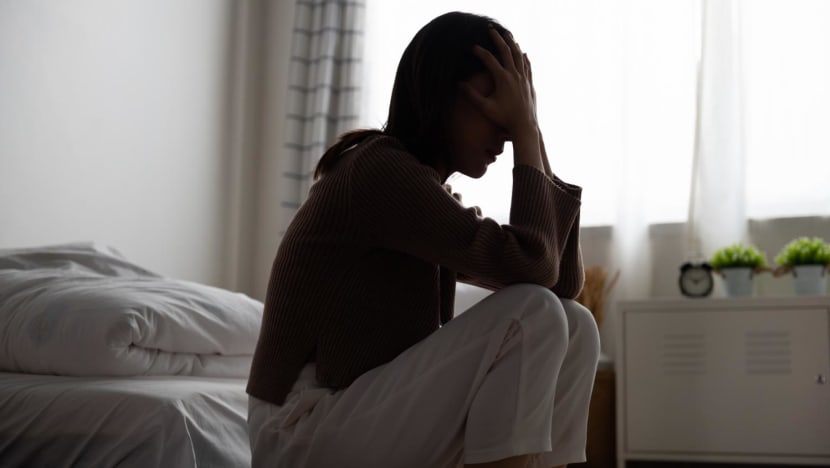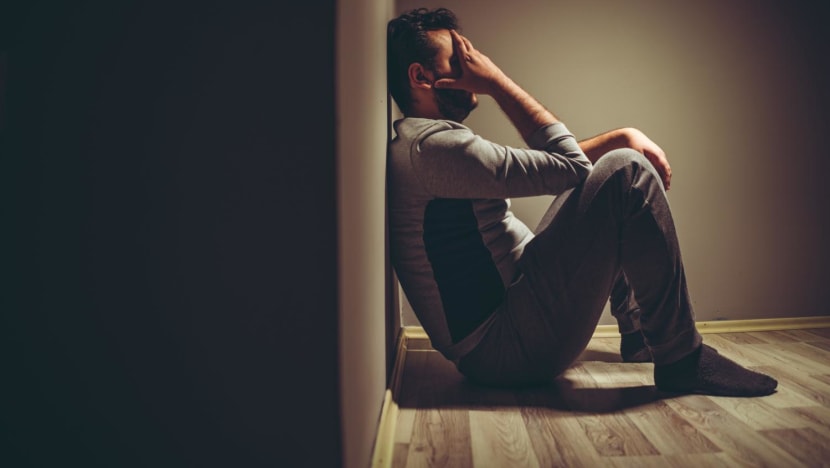'It’s okay to seek help': Why do people in Singapore struggle with mental health issues?
'It’s okay to seek help': Why do people in Singapore struggle with mental health issues?
“In a mental health journey, the struggle isn't like a straight line. It goes up and down,” a university student dealing with various mental health conditions from a young age told CNA podcast Heart of the Matter.

SINGAPORE: Even at the age of seven, Rae (not her real name) felt different from her schoolmates.
“I was thinking about things like money. I was thinking about things like getting good grades in order to do well in life in the future and get a stable job,” recalled the 23-year-old university student. “So I unknowingly carried a lot of burdens.”
Growing up, Rae had a chaotic childhood marked by instability at home and conditioned herself not to show emotions.
She was later diagnosed with panic disorder at the age of 15, generalised anxiety disorder at 18, and major depressive disorder at 19.
“Although I would say that the physical symptoms only came up in my teenage years, I am not sure until now whether the roots of it began when I was really young, during my childhood,” Rae, who is still on medication and coping with symptoms of anxiety, told CNA podcast Heart of the Matter.
“In primary school, I remembered being a child who was easily stressed, even though like my parents did not place any pressure on me in studying. But I was just someone who placed a lot of pressure on herself.”
Why people struggle with mental health issues in Singapore
PREVALENCE OF POOR MENTAL HEALTH INCREASING
Mental health has worsened in Singapore but more are willing to seek help, according to a survey by the Ministry of Health (MOH).
The National Population Health Survey, which was released last month, found that the prevalence of poor mental health rose from 13.4 per cent in 2020 to 17 per cent in 2022.
“The most difficult part was the loneliness of the journey and not understanding the seriousness of what I was going through,” said Rae, who was often misunderstood by her teachers as being lazy whenever she tried to recover from chest pains by taking deep breaths and putting her head on her desk to rest.
“I went on the internet, did some research and I realised that my symptoms have been going on for quite some time.”

Younger adults aged 18 to 29 years had the highest proportion with poor mental health, compared to other age groups.
There were also more females with poor mental health compared to males, the results showed.
“In my mental health journey, it took a while for my parents to develop some form of understanding. That's when really so many things are bottled up,” said Rae.
“I was repressing a lot of my symptoms and a lot of the discomfort and the emotions that were just bombarding me.”

EXPERIENCING OVERWHELMING EMOTIONS
For Mr Mak Kean Loong, who has been unemployed for six years since he was diagnosed with depression in 2017, the emotions experienced can be overwhelming.
“I haven't been able to work. The thought of starting to think about work has brought me into tailspins, where the emotions are so overwhelming that I cannot actually deal with them,” said the 44-year-old, who joined Rae on the show.
“And I have to shut down and I stay at home and I don't do anything.”
The electrical engineering graduate from the National University of Singapore had previously worked in IT for several companies.

In 2017, he started a new job, which was supposed to be his dream job.
“I think it was my dream job, that kind of job that I've always been aiming for in my career, that they're gonna give me responsibility to do research and implement things that I really wanted to implement in the industry,” he noted.
But once, when he was in the office, he had a panic attack and spent the entire day trying not to cry. That night, he went to a general practitioner, who spent 15 minutes convincing him to take time off work.
His boss and colleagues were also supportive, but things did not get better.
His condition became progressively worse and he even wanted to take his own life.

But Mr Mak decided to make one final call for help and called the Institute of Mental Health (IMH) hotline.
“I told myself, I will call them, I will be honest with them, I will not hang up first and I'll do what they say. Those were the conditions I laid,” said Mr Mak, who was asked to visit the IMH’s emergency services.
“I talked to the doctor and he refused to let me go.”
Mr Mak was warded for six days before being discharged.
Six years on, he is still in recovery and under intensive therapy and medication.

WHY IS IT SO HARD FOR PEOPLE TO REACH OUT?
As a father of two teenagers aged 14 and 16, Mr Mak feels troubled by societal expectations, where a man has to be strong and deal with his own problems.
“I find that people my age and Asian men, in particular, tend to think of ourselves as providers, (that) we've got to be strong,” said Mr Mak.
“It’s okay to seek help. Because it's not like you're not strong. Even admitting that you need help is strength, and all you're doing is leaning on someone for a little bit and it will get better.”
He said his wife is a prime example of a great support system, as she has been there for him and never blames him.

“Financially, we're very fortunate (and) very blessed, because my church and my extended family take care of us,” said Mr Mak.
“With that as the backdrop, it allowed me much more space, much more time to actually work on what really is the issue.”
He said one thing that is not usually talked about is internal stigma.
“It's not just about burdening others, but (the idea that) my problem is not big enough. Or if I even open my mouth to admit that I need some form of help, I’ve failed myself,” he noted.
“Sometimes that internal stigma is so strong that (it feels like) you're stuck in a conversation with yourself in a silo. You can't reach out, you can't have people reach in, you don't know what to do.”
Mr Chris Wong, a senior clinical psychologist with Resilienz Clinic, agreed that the stigma of mental health illnesses or conditions has stopped people “from talking about their mental health issues, because of the implications (and) how people will look at them”.

MENTAL HEALTH LITERACY HAS IMPROVED
However, he noted that mental health literacy has improved over the years.
“In the past, I think people just didn't know. It can be quite hard to explain that to other people, because these symptoms are not visible,” Mr Wong added.
“It's not like you have a fall, you have a sprain or you have a cut. It's hard for people outside to understand what it really feels like to feel down, depressed, or to be experiencing anxiety all the time.”
On what could have led to these issues, he said: “When we try to understand our clients' stories, and the problems that they present with, we know that it's not always just a single trigger.
“We talk about predisposing factors, which are basically things or events that might have predisposed them to developing what they have developed today.”
He added that there are various predisposing factors, which can include a difficult childhood, neglect, abuse and bereavement.
“These accumulate and add up. Throughout our lives, we encounter stress all the time,” said Mr Wong.
“For some of us, some of these stresses can be too much to bear until where the point comes and there is this so-called trigger. That's when the onset of symptoms become more obvious, and people get diagnosed.”
WHAT CAN LOVED ONES LOOK OUT FOR?
Earlier this month, Singapore launched the National Mental Health and Well-Being Strategy to tackle the issue.
It aims to create a mental health ecosystem comprising accessible and quality clinical care with a supportive community, where individuals with mental health needs can seek help early without stigma and be supported in their recovery.
The strategy helps people to access mental health support, said Mr Wong.
“There are different avenues, different services. If (the general community) knows what's happening to people around them, it becomes that much easier and also timely to intervene,” he said.
“For that to happen, people need to better understand what mental health is, what are some of the signs and some of the symptoms and how they can support (those facing such issues).”
Mr Wong said people can look out for a few signs that their loved ones are struggling with mental health issues, including whether there are changes in their moods and behaviours.
“Do they seem like they don't enjoy things as much as people? Do they seem like they get stressed much more than others? So mood is one of them,” he added.
“Behaviour is another thing, like are there changes in the person's behaviours. Have they been doing certain things more, or certain things less than usual?”
CHECKING IN WITH LOVED ONES
Taking time to check in with loved ones, especially if they are going through significant events such as life transitions, job changes, unemployment and loss, is important.
“There's no harm checking in with the person,” said Mr Wong.
“Because the worst thing is that if you're wrong, you're just wrong and they will tell you that everything's okay. If you were right, then you might have helped someone.”
Besides checking in with individuals who may be facing mental health issues, people can be active listeners.
“One thing I would encourage in terms of help, that along my journey I wish I had more of, is simply people who know how to listen. And by listening, I don't just mean being quiet and not commenting,” said Mr Mak.
“I mean active listening, (having) compassion, and (believing) what I have to share, what I have to say (as) I'm already doubting myself. I'm already at a stage where I have no self-esteem. If I could ask for more help, it would be people who listen with compassion.”
Mental health advocates said society should also encourage people to be kinder to themselves.
“In a mental health journey, the struggle isn't like a straight line. It goes up and down,” said Rae.
“For me, 10 years in and I wish I can say that I'm free, but I'm actually still struggling. If you are struggling with a disorder or symptoms of any form of disorder, I think it's so important to sometimes acknowledge that it's okay to be different.”





